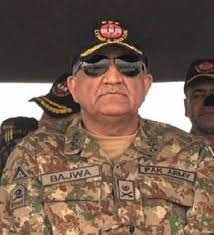Pakistan’s Military Diplomacy: Reference to ‘Bajwa Doctrine’

By Ahmad Khan 14 November 2022
No nation can live without a strong military. Right after the agricultural revolution when human domesticated animals and had food in surplus, the army was needed to secure this commodity. Different techniques of warfare kept on evolving with time as the nature of threats and response of societies towards these threats changed. So, as the threats have become stronger with the advent of hybrid warfare, a stronger army is also needed to counter these threats. The point to note here is that the duties of army have expanded from countering traditional as well as non-traditional threats also. Pakistan is also facing such horrendous threats from its rivals. Leadership, not just political but military is also necessary to cater to these threats. Threats from external forces and internal extremist organizations needs a strong headed military leader in Pakistan that can effectively manage these threats and ensure peace inside and outside.
In November 2016, General Qamar Javed Bajwa was promoted to the rank of four-star general to lead the Pakistan army as Chief of the Army Staff. At the time Pakistan was not at peace also. Threats from India remain alive and terrorist outfits were raising their heads again. It was necessary to take strict actions against these terrorist organizations and have a diplomatic approach regarding Pakistan’s military posture outwards. Former Director General of Inter-Services Public Relations, Asif Ghafoor termed General Bajwa’s approach as ‘Bajwa Doctrine’ on media during a press conference. Initially, the term was misinterpreted as something of political in nature. Later DG ISPR cleared that the concept had nothing to do with the politics, rather every COAS had some approach towards internal and external situation. The doctrine prompted Pakistan aggression towards threats from terrorist organization while making peaceful relations with the outside world. Pakistan during his tenure has made quite enough progress in suppressing the terrorist outfits as well as prompting the narrative of Pakistan as a peaceful country abroad. Peaceful does not mean the country’s inability to respond to any threats, rather its intentions of peace but resolution to counter any offensive if there is.
Pakistan has followed quite sound military diplomacy under General Bajwa’s tenure. Launching Operation Raddul Fasaad to banish terrorist networks from inside Pakistan. Pakistan achieved good progress with its military diplomacy towards the external environment. The country under General Bajwa promoted peace outside and conducted joint military exercises with regional as well as extra-regional countries mainly China, USA and Russia to enhance defence cooperation with he world powers. Some of these exercises are ‘Fajr-ul-Sharq’ between Pakistan and Jordan, Counter-terrorism training of Nierian forces by SSG team, ‘Druzba-2017 between Russia and Pakistan, ‘Al-Shehab-2’ between Pakistan and Saudi Arabia, ‘Warrior-VI 2018’ between Pakistan and China, ‘Sea Guardian-2020’ between Pakistan Navy and PLA Navy, ‘Ataturk-XI’ between Pakistan and Turkey, ‘Aman-21’ joined by Russia, NATO allies and US and UK, and ‘Falcon Talon -2022 between Pakistan Air Force and the US Air force.
It evinces Pakistan’s defence cooperation with world powers. Apparently, these exercises are just normal event, but there are themes and agendas behind countries’ support to each other’s in times of troubles. Pakistan had been known as a state with enormous terrorism spreading not just inside the country but also around the world. Under Bajwa’s tenure, the world has come to realize Pakistan’s efforts in counter terrorism as well as promoting peace in the region. But he responded effectively when some forces tried to consider Pakistan’s intentions for peace as its weakness. In February 2019, a suicide attack killed 40 Indian paramilitary soldiers in Pulwama. India blamed Pakistan for the attack and conducted air strike in Balakot, violating Pakistan’s territorial sovereignty. Pakistan retaliated and, in a dogfight two Indian fighter jets were downed to the ground. One Indian fighter was captured, who was later returned as a peace gesture. So, Pakistan has achieved a lot in its military posture during General Bajwa. Internally, as well as externally, his struggle for peace has brought many successes.
In the current political turmoil in Pakistan, the politicians have been fetching the military inside the politics and calling out General Bajwa as behind all the turmoil. Looking at the aspects of hybrid warfare, and vulnerabilities of Pakistan, at least the elite must try to have civil-military cooperation. However, what General Bajwa has done for Pakistan’s military diplomacy is appreciable.
